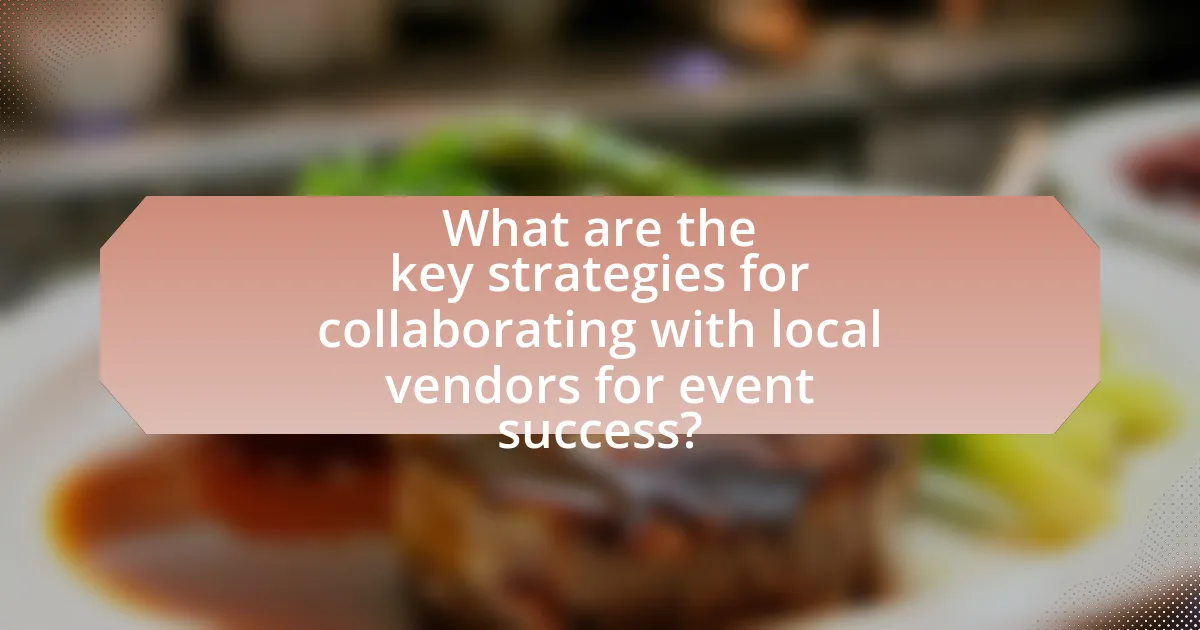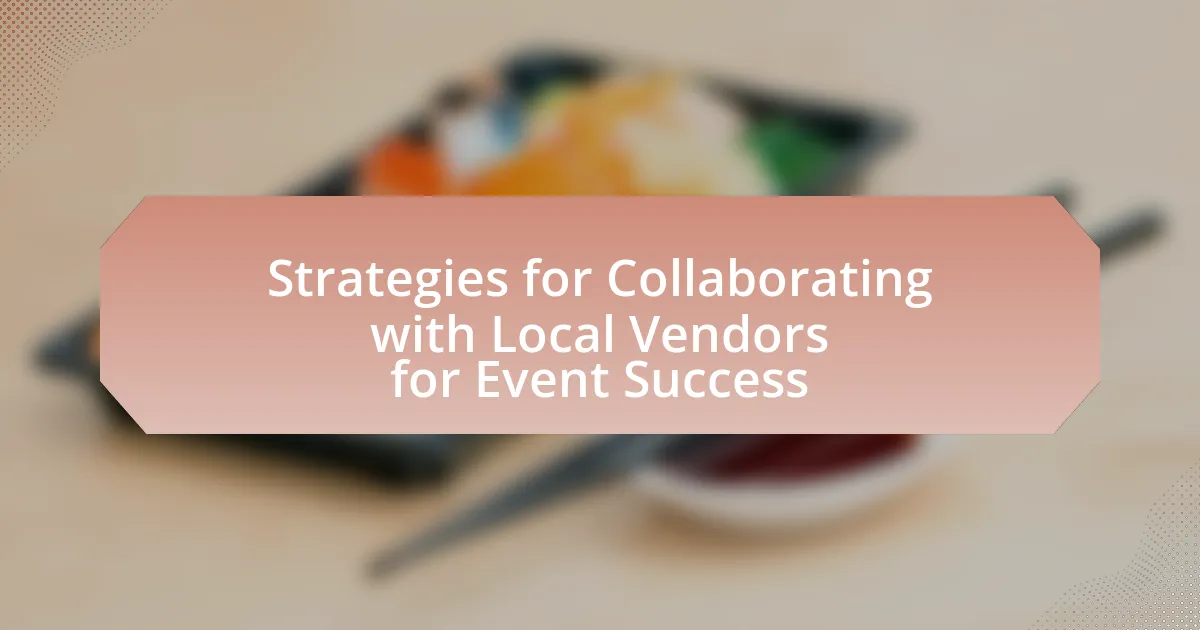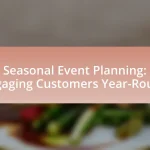The article focuses on strategies for collaborating with local vendors to ensure event success. Key strategies include establishing clear communication, building strong relationships, and leveraging local knowledge to enhance the event experience. Effective communication tools, regular updates, and setting clear expectations are emphasized as essential for fostering trust and collaboration. The article also discusses best practices for selecting and negotiating with vendors, as well as addressing potential challenges in vendor partnerships. Overall, it highlights the importance of mutual respect and understanding each party’s strengths to achieve successful outcomes in event planning.

What are the key strategies for collaborating with local vendors for event success?
Key strategies for collaborating with local vendors for event success include establishing clear communication, building strong relationships, and leveraging local knowledge. Clear communication ensures that both parties understand expectations, timelines, and deliverables, which is crucial for smooth operations. Building strong relationships fosters trust and encourages vendors to go the extra mile, enhancing the overall event experience. Leveraging local knowledge allows event planners to tap into vendors’ insights about the community, which can lead to unique offerings and better audience engagement. These strategies are supported by the fact that successful events often rely on effective partnerships, as evidenced by case studies showing increased satisfaction and reduced logistical challenges when local vendors are involved.
How can effective communication enhance collaboration with local vendors?
Effective communication enhances collaboration with local vendors by fostering clear expectations and building trust. When event organizers articulate their needs and timelines effectively, vendors can align their services accordingly, reducing misunderstandings and delays. For instance, a study by the Project Management Institute found that effective communication can improve project success rates by up to 20%. This clarity not only streamlines operations but also encourages a cooperative relationship, enabling vendors to provide tailored solutions that meet specific event requirements.
What communication tools are most effective for vendor collaboration?
Effective communication tools for vendor collaboration include project management software, instant messaging platforms, and video conferencing tools. Project management software like Trello or Asana allows teams to track tasks, deadlines, and responsibilities, enhancing transparency and accountability. Instant messaging platforms such as Slack facilitate real-time communication, enabling quick decision-making and issue resolution. Video conferencing tools like Zoom or Microsoft Teams support face-to-face interactions, which can strengthen relationships and improve understanding. These tools collectively enhance collaboration efficiency, as evidenced by a study from the Project Management Institute, which found that organizations using project management tools experience a 20% increase in project success rates.
How can regular updates improve vendor relationships?
Regular updates enhance vendor relationships by fostering transparency and trust. When businesses consistently communicate progress, changes, and expectations, vendors feel valued and informed, which strengthens collaboration. Research indicates that effective communication can lead to a 25% increase in vendor satisfaction, as it reduces misunderstandings and aligns goals. This proactive approach not only improves operational efficiency but also encourages vendors to invest more in the partnership, ultimately contributing to event success.
Why is it important to establish clear expectations with local vendors?
Establishing clear expectations with local vendors is crucial for ensuring successful collaboration and event execution. When expectations are clearly defined, both parties understand their roles, responsibilities, and deliverables, which minimizes the risk of misunderstandings and errors. For instance, a study by the Project Management Institute found that projects with well-defined requirements are 50% more likely to be completed on time and within budget. This clarity fosters accountability, enhances communication, and ultimately leads to a smoother operational process, contributing to the overall success of the event.
What specific expectations should be set for vendors?
Vendors should be expected to deliver quality products and services on time, adhere to agreed-upon budgets, and maintain clear communication throughout the collaboration process. These expectations ensure that the event runs smoothly and meets the desired standards. For instance, a study by the Event Marketing Institute highlights that timely delivery and quality assurance are critical factors in vendor performance, directly impacting event success.
How can clear expectations prevent misunderstandings?
Clear expectations prevent misunderstandings by providing a defined framework for communication and responsibilities among all parties involved. When event planners articulate specific goals, timelines, and deliverables to local vendors, it minimizes ambiguity and aligns everyone’s understanding of the project requirements. Research indicates that clear communication can reduce misunderstandings by up to 70%, as it fosters transparency and accountability. This clarity ensures that vendors know exactly what is expected, leading to smoother collaboration and successful event outcomes.
What role does building trust play in vendor collaboration?
Building trust is essential in vendor collaboration as it fosters open communication and reliability. When trust is established, vendors are more likely to share critical information, adhere to deadlines, and deliver quality services, which enhances overall event success. Research indicates that organizations with high levels of trust in their vendor relationships experience a 50% increase in project efficiency and a 30% reduction in costs, demonstrating the tangible benefits of trust in collaboration.
How can event planners build trust with local vendors?
Event planners can build trust with local vendors by establishing clear communication and demonstrating reliability. Clear communication involves setting expectations, discussing timelines, and providing detailed information about the event. Reliability is shown through consistent follow-through on commitments, such as timely payments and honoring agreements. According to a study by the Event Marketing Institute, 80% of event professionals believe that strong relationships with vendors lead to better event outcomes, highlighting the importance of trust in successful collaborations.
What are the long-term benefits of trust in vendor relationships?
The long-term benefits of trust in vendor relationships include enhanced collaboration, improved communication, and increased reliability. Trust fosters a collaborative environment where vendors are more willing to share insights and resources, leading to innovative solutions and better event outcomes. Improved communication arises from trust, as both parties feel comfortable discussing challenges and opportunities openly, which can prevent misunderstandings and streamline processes. Increased reliability is another benefit, as vendors who trust their clients are more likely to prioritize their needs, ensuring timely delivery and quality service. Research indicates that organizations with high levels of trust in their vendor relationships experience up to 50% lower transaction costs and improved service quality, demonstrating the tangible advantages of fostering trust over time.
How can event planners effectively select local vendors?
Event planners can effectively select local vendors by conducting thorough research and utilizing a structured evaluation process. This involves identifying potential vendors through local directories, online reviews, and recommendations from previous clients. Planners should assess vendors based on criteria such as experience, reliability, quality of service, and pricing. Additionally, meeting vendors in person or via video calls allows planners to gauge their professionalism and communication skills. According to a survey by Eventbrite, 70% of event planners prioritize vendor reliability and quality when making selections, underscoring the importance of these factors in the decision-making process.
What criteria should be considered when choosing local vendors?
When choosing local vendors, key criteria include reliability, quality of products or services, pricing, and local reputation. Reliability ensures that vendors can meet deadlines and fulfill commitments, which is crucial for event success. Quality of products or services directly impacts the overall experience of the event, as high-quality offerings enhance attendee satisfaction. Competitive pricing is essential for budget management, allowing for cost-effective decisions without compromising quality. Local reputation can be assessed through reviews, testimonials, and past performance, providing insight into the vendor’s reliability and service quality. These criteria collectively contribute to effective collaboration with local vendors, ultimately leading to successful events.
How can event planners assess vendor reliability and quality?
Event planners can assess vendor reliability and quality by conducting thorough research, including checking references, reading reviews, and evaluating past work. Research shows that 70% of event planners rely on online reviews and testimonials to gauge vendor performance. Additionally, planners should request and review portfolios to ensure the vendor’s style aligns with the event’s vision. Engaging in direct communication with vendors to discuss expectations and past experiences can further clarify their reliability. This multi-faceted approach ensures that planners make informed decisions based on concrete evidence of a vendor’s capabilities.
What are the best practices for negotiating with local vendors?
The best practices for negotiating with local vendors include establishing clear communication, understanding the vendor’s needs, and being prepared to compromise. Clear communication ensures that both parties understand expectations and requirements, which can prevent misunderstandings. Understanding the vendor’s needs allows for a more collaborative approach, fostering a positive relationship. Being prepared to compromise demonstrates flexibility, which can lead to mutually beneficial agreements. Research indicates that effective negotiation strategies can enhance vendor relationships and improve overall event success, as highlighted in studies on negotiation tactics in business settings.
How can event planners approach negotiations to achieve win-win outcomes?
Event planners can approach negotiations to achieve win-win outcomes by prioritizing open communication and understanding the needs of both parties. By actively listening to vendors and clearly articulating their own requirements, planners can identify common goals and areas for compromise. Research indicates that effective negotiation strategies, such as collaborative problem-solving and interest-based bargaining, lead to more satisfactory agreements for all involved. For instance, a study published in the Journal of Business Research highlights that negotiations focusing on mutual benefits result in higher satisfaction rates and long-term partnerships.
What common pitfalls should be avoided during vendor negotiations?
Common pitfalls to avoid during vendor negotiations include failing to conduct thorough research on the vendor, which can lead to unfavorable terms. Additionally, not clearly defining expectations and deliverables can result in misunderstandings and unmet needs. Another significant mistake is neglecting to establish a budget upfront, potentially leading to overspending. Lastly, allowing emotions to drive decisions rather than focusing on objective criteria can compromise the negotiation process. These pitfalls can hinder successful collaborations and ultimately affect event outcomes.
How can event planners leverage local vendors for unique event experiences?
Event planners can leverage local vendors by forming partnerships that enhance the authenticity and uniqueness of event experiences. Collaborating with local caterers, florists, and entertainers allows planners to incorporate regional flavors, styles, and cultural elements, which can create a memorable atmosphere tailored to the local community. For instance, using a local caterer can provide dishes that reflect the area’s culinary heritage, while local artists can offer entertainment that resonates with the audience. This approach not only supports the local economy but also fosters a sense of community and connection among attendees, making the event more engaging and meaningful.
What types of local vendors can enhance the event experience?
Local vendors that can enhance the event experience include food and beverage providers, entertainment services, and decor specialists. Food and beverage providers, such as local caterers and breweries, offer unique culinary experiences that reflect the local culture, which can significantly elevate guest satisfaction. Entertainment services, including local musicians, performers, and speakers, create engaging atmospheres that keep attendees entertained and involved. Decor specialists, such as florists and event designers, contribute to the visual appeal of the event, making it more memorable. Collaborating with these types of vendors not only supports the local economy but also enriches the overall event experience by providing authenticity and variety.
How can local vendors contribute to the event’s theme and atmosphere?
Local vendors can enhance the event’s theme and atmosphere by providing products and services that align with the event’s objectives. For instance, if the event focuses on local culture, vendors can offer traditional foods, crafts, and entertainment that reflect the community’s heritage. This not only enriches the attendee experience but also fosters a sense of authenticity and connection to the locale. Additionally, local vendors often have established relationships within the community, which can attract more attendees and create a vibrant atmosphere. Their participation can also lead to unique collaborations, such as themed decorations or interactive experiences, further immersing guests in the event’s theme.
What are the potential challenges in collaborating with local vendors?
Collaborating with local vendors can present several challenges, including communication barriers, differing expectations, and logistical issues. Communication barriers may arise due to language differences or varying levels of familiarity with industry terminology, which can lead to misunderstandings. Differing expectations often stem from cultural differences or varying standards of quality and service, potentially resulting in dissatisfaction. Logistical issues can include difficulties in coordinating schedules, transportation, and resource availability, which may hinder timely execution of event plans. These challenges can impact the overall success of the collaboration and the event itself.
How can event planners address common challenges in vendor collaboration?
Event planners can address common challenges in vendor collaboration by establishing clear communication and setting defined expectations from the outset. Effective communication minimizes misunderstandings and ensures that all parties are aligned on goals, timelines, and deliverables. According to a study by the Event Marketing Institute, 70% of event professionals cite communication as a critical factor in successful vendor relationships. Additionally, utilizing collaborative tools and platforms can streamline interactions and facilitate real-time updates, further enhancing coordination among vendors.
What strategies can mitigate risks associated with vendor partnerships?
To mitigate risks associated with vendor partnerships, organizations should implement thorough due diligence, establish clear contracts, and maintain open communication. Conducting due diligence involves assessing a vendor’s financial stability, reputation, and past performance, which helps identify potential risks before entering a partnership. Clear contracts should outline expectations, deliverables, and penalties for non-compliance, ensuring both parties understand their responsibilities. Open communication fosters transparency and allows for the timely resolution of issues, reducing misunderstandings that could lead to conflicts. These strategies collectively enhance the reliability of vendor partnerships and minimize associated risks.
What are the key takeaways for successful collaboration with local vendors?
Successful collaboration with local vendors hinges on clear communication, mutual respect, and understanding of each party’s strengths. Establishing open lines of communication ensures that expectations are aligned and any issues can be addressed promptly. Mutual respect fosters a positive working relationship, encouraging vendors to go the extra mile. Understanding each vendor’s strengths allows for better resource allocation and maximizes the effectiveness of the collaboration. For instance, a study by the Institute for Local Self-Reliance found that businesses that prioritize local vendor partnerships often see a 25% increase in customer loyalty, demonstrating the tangible benefits of effective collaboration.
What actionable tips can improve vendor collaboration for future events?
To improve vendor collaboration for future events, establish clear communication channels from the outset. This ensures that all parties understand expectations, timelines, and responsibilities, which is crucial for effective collaboration. Regular check-ins and updates can help maintain alignment and address any issues promptly. Additionally, creating a shared digital workspace can facilitate information sharing and streamline coordination. Research indicates that organizations with strong communication practices experience 25% higher productivity, underscoring the importance of this approach in vendor relationships.
How can event planners continuously improve their vendor relationships?
Event planners can continuously improve their vendor relationships by maintaining open communication and providing constructive feedback. Open communication fosters trust and ensures that both parties are aligned on expectations and goals. Regularly sharing feedback helps vendors understand areas for improvement and strengthens collaboration. Additionally, event planners can engage in regular check-ins and meetings to discuss performance and address any concerns, which has been shown to enhance partnership satisfaction and effectiveness. According to a study by the Event Marketing Institute, 70% of successful event planners attribute their success to strong vendor relationships, highlighting the importance of ongoing engagement and communication.


